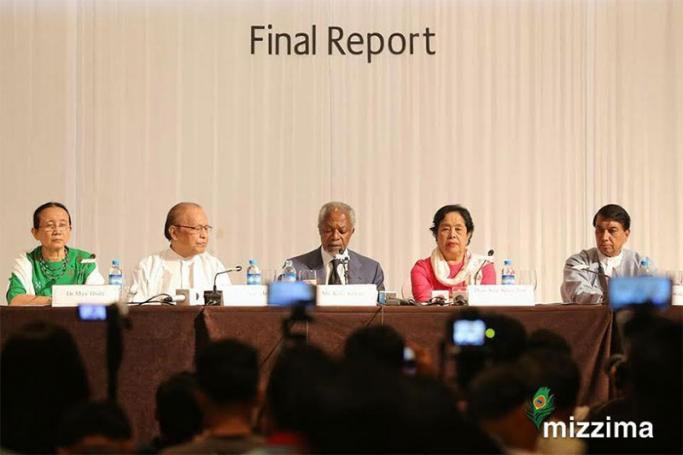The State Counsellor’s office has issued a statement in response to the Final Report of the Advisory Commission on Rakhine State that was released yesterday. The following is the text in full.
“1. The Office of the State Counsellor expresses its sincere appreciation to Dr. Kofi Annan and the members of the Advisory Commission for their continued efforts to find constructive ways forward for Rakhine State.
2. As the Commission recognizes, the situation in Rakhine State is deeply complex and there are no quick fix solutions. The challenges have only been compounded by chronic underdevelopment – Rakhine is one of Myanmar’s poorest states. Sadly, we have also seen a resurgence of violence in recent weeks and there have been very troubling signs of external interference aimed at aggravating an already difficult situation.
3. In this context, recommendations for meaningful and long-term solutions are very welcome. We will give the report our full consideration with a view to carrying out the recommendations to the fullest extent, and within the shortest timeframe possible, in line with the situation on the ground. We hope to set out a full roadmap for implementation in the coming weeks.
4. As an immediate step, a new Ministerial-led committee responsible for the implementation of the Commission’s recommendations will be established. This will comprise representatives from across government and will be responsible for overseeing delivery and reporting regularly on its progress.
5. The new Committee will be assisted by an Advisory Board on Rakhine. The Board will include regional and international experts, as well as Myanmar nationals. It will provide an external perspective and advice to support the Committee in its work.
6. Details of both bodies are currently being finalised and will be released shortly.
7. This government is serious in its efforts to find a way forward for Rakhine. We have made rule of law and development in Rakhine State a priority since taking office.
8. While there is much still to do, progress has been made and a number of recommendations made in the Commission’s August interim report have already been implemented.
(a)
Healthcare access has been improved through new mobile clinics. We have upgraded schools and vocational and technical training programmes have begun.
(b)
Hundreds of new jobs and opportunities have been created for local people through public-private partnerships and we are also assessing the viability of a new Special Economic Zone that would bring new jobs and businesses to the region.
(c)
In terms of new infrastructure, electrification has been expanded and new roads and bridges built, including a new highway connecting remote areas previously only accessible by boat.
(d)
We are working to promote religious harmony and communal relations by engaging interfaith groups. We plan to introduce a new curriculum in schools with a focus on moral, civic and peace education.
(e)
We have developed a strategy and timeline to move forward the National Verification Process, as well as a strategy to close IDP camps in Rakhine State. Three IDP camps have been closed, and new houses are being built near the IDP camps.
(f)
In cooperation with the EU and UN bodies, we are providing training and capacity building for police and security forces in the areas of human rights, child protection and gender-based violence.
9. As we seek a path forward for all the people of Rakhine, we must accept that there are difficulties that cannot be resolved overnight. We are working to change mind-sets and to build trust between all communities so that tolerance, respect, and eventually peace, may take hold. Now more than ever, it is important to focus on resolving, and not inflaming the issues in Rakhine.”












